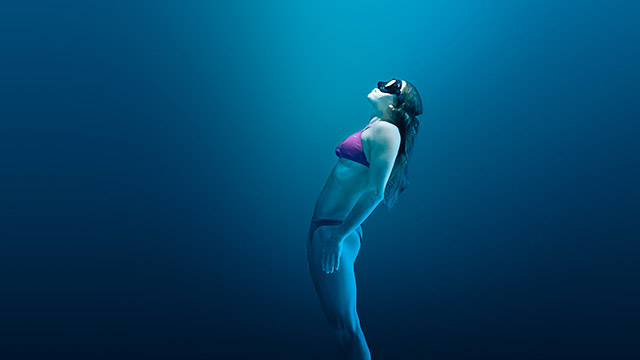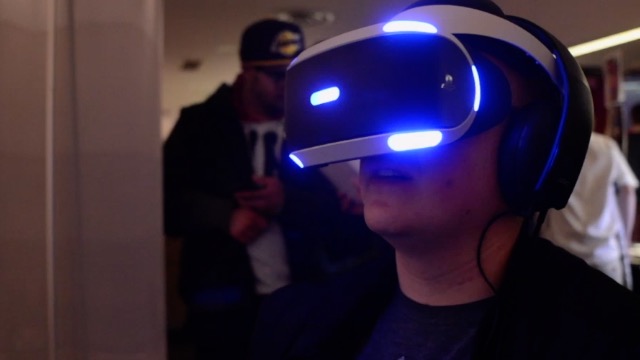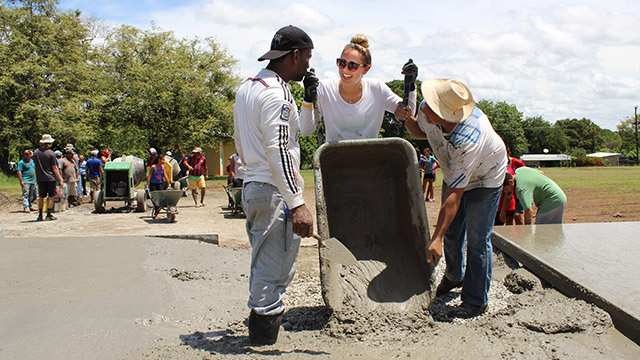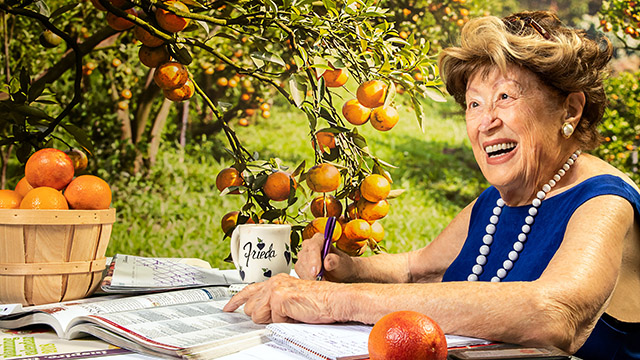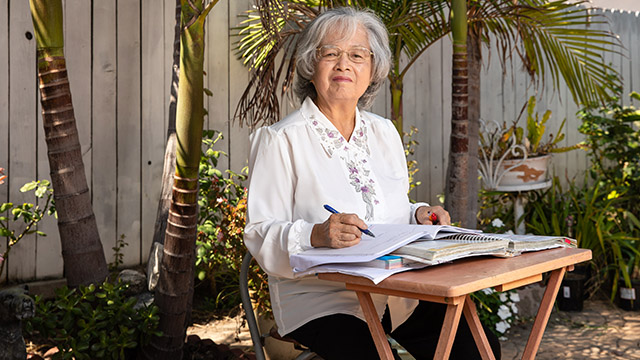Simply Breathtaking
By Janis Carr
A mother humpback whale floats by with her calf at her side. A pod of dolphins settles nearby for a nap. Fish of all sizes, colors and menacing teeth swim past in schools, sometimes alone. Meanwhile, sea lions warily eye a prized catch.
Free divers are treated to these breathtaking underwater views without taking a breath, whereas the closest most people get to seeing sea creatures is at an aquarium, on television or through a thick SCUBA mask.
Freediving allows divers to view the underwater world up close, closer than SCUBA divers because they don’t make noise with air tanks that can scare away the wildlife. Free divers move quietly through the deep, sometimes unnoticed, other times viewed by curious eyes.
Free diver Nathan Lucas has stared into those unblinking eyes in waters across the globe. He once found himself surrounded by a pod of dolphins off the coast of Kona, Hawaii, a sight he isn’t apt to forget anytime soon.
“I’m waiting for my dive reflex to kick in (signal that he needs to head to the surface) and I’m just lost in the moment,” he said. “It was an unreal moment, where I was a part of their world and their environment.
“It was a moment that every now and then I still dream about. It was absolutely beautiful.”
Lucas is a Long Beach firefighter and freediving instructor intent on sharing his underwater world, but only with the proper training. It’s his vision. While the beauty of the sport lures many, freediving also can be deadly.
“Freediving has been done for years, but more and more were dying off our coast, so I decided to learn more about this,” said Lucas, owner of Apnea Addicts, a freediving school in Long Beach. “I wanted to know more about this obscure sport.”
As a kid, Lucas carried his snorkel and fins wherever he went, whether it was to the beach or on family vacations. He even brought them to Yosemite and was delighted to find a river, where he could explore with his mask and fins.
His early explorations only fueled his appetite for the water and he expanded his snorkeling by diving deeper, exploring further and experiencing more. At age 12, he received his SCUBA certification.
“I got hooked on SCUBA,” he said. “That’s all I ever wanted. So, I saved my money from mowing lawns and stuff to take the course, but I wasn’t water savvy.”
Lucas, who attended Long Beach State while training to become a fireman, initially wanted to be a whale and dolphin trainer. Think SeaWorld.
“I wanted to swim with Flipper,” said Lucas, referring to the popular 1960s television show. He abandoned that idea after discovering what he felt was amusement parks’ unethical treatment of mammals. His desire to mingle with dolphins, however, remained strong.
Diving with aqua tanks got him close, but not close enough. It also didn’t provide Lucas with the athletic training he sought, so he went back to snorkeling before someone suggested freediving.
“I thought ‘free diving, that’s what those crazy guys do’,” Lucas said.
Call Lucas crazy. His record time holding his breath underwater without moving, or static apnea, is 5 minutes, 20 seconds and more than three minutes while moving. Lucas has reached a depth of 50 meters or 165 feet in free immersion diving, and his personal best in constant weight with fins is 45 meters (150 feet) and 40 meters without the use of fins.
The world record for free immersion diving is 253 meters, held by Austrian Herbert Nitsch, who holds 32 other world records across all disciplines.
Lucas said free diver Martin Stepanek can hold his breath for more than eight minutes and was the first person to dive more than 400 feet on a single breath. Stepanek is founder of Freediving Instructors International, an organization that governs Lucas’ classes.
Lucas cautions anyone who thinks that freediving sounds glamorous. There were 70 freediving deaths recorded in 2016, 50 more than the previous year, according to Divers Alert Network. Many deaths are believed not to have been reported.
It’s for that reason, Lucas’ vision is lower the death rate by teaching free divers in the area how to dive through strict training and safety classes at Apnea Addicts, where he teaches the ins and outs of the sport.
“There’s an extreme sense of pleasure I get when I take someone to the that same experience that I have experienced myself,” Lucas said. “That’s probably my most rewarding moment.”
There are two common disciplines: static apnea, in which the diver holds his or her breath for as long as possible, and dynamic apnea (a Greek word meaning “without breathing”), which involves swimming as far as possible under water.
The sport is based on the mammalian diving reflex, a subconscious reflex that shifts the bloodstream from the extremities into the brain and heart, thereby slowing down the heart rate. This enables the body to keep vital organs functioning and concentrates the flow of oxygen into the heart and brain.
As a diver descends, he or she must equalize the pressure in their ears by pinching their nose and blowing. As the diver goes deeper, the walls of the lungs shrink, while at the same time filling with blood and hardening to counteract the increasing pressure at depth.
“You can feel your lungs getting smaller and your air space getting smaller and you’re just trying to equalize,” Lucas said. “That’s when you get the sense that the ocean is hugging you. There really is no way to describe the feeling. You can only get it with depth.”
There are more precautions for divers to know as they ascend. They must take their time, don’t stop and don’t exhale to avoid blacking out. Once above the water, keep breathing because a diver’s lowest level of oxygen occurs 20 seconds after surfacing.
“When you train, you slowly learn to replace your flight-or-fight response,” Lucas said. “If you don’t know your physiology when panic sets in, you won’t know how to calm yourself down. You won’t know how to change that.”
The panic can come from seeing a predatory sea creature or thinking you can’t make it back to the surface.
“In freediving, you literally learn how to change your brain (and realize) this isn’t a dangerous interaction,” Lucas said. “It is a trained interaction and you have control over this interaction.”
Lucas said he hasn’t experienced any serious panic attacks, outside of an encounter with a pesky black sea bass, which was intent on stealing his catch during a spearfishing excursion.
“Knock on wood I don’t have that scary moment,” he said, “but if I do, hopefully I handle it well with the training I have.”


